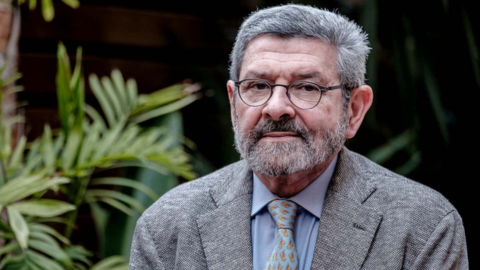Professor Joan Baptista Culla has left us

Joan Baptista Culla Clarà, retired professor at the Faculty, has left us.
30/11/2023
Death has not caught our colleague Joan B. Culla by surprise. He had been fighting the disease for many months. A fight that has faced with lucidity, integrity and serenity. The serenity of those who have been able to live feeling free, jealous of their convictions and generous sharing knowledge. And, above all, giving value to the treasure of friendship. Certainly, Joan could be a buckled polemist, but not rancunities. I am aware that in the many years we have coincided in the Faculty of Communication Sciences we did not always have coinciding criteria. But the occasional differences did not prevent us from weaving solid complicities as well. From less to more.
His refined sense of humour and his firmness and determination when confronting death, we had emotional evidence on 21 September, in the act that the newspaper Ara, the CCCB and a group of friends and colleagues coordinated by Professor Borja de Riquer dedicated to him. A unique tribute, conceived and organized when it was already known that the disease was winning the battle cruelly, irreversibly. This was a strangely emotional tribute, full of respect, affection and admiration, which allowed us to contact Joan Culla more human, more endearing, wiser. A very exceptional farewell ritual, unique. A ritual paradoxically full of life.
Of course, today, Wednesday 29 November, the media review our colleague’s intense academic and public biography. A logical, fair and well-deserved exercise. Necessary. But we, their colleagues at the Faculty, do not need to do this curricular exercise. We have enjoyed its presence for more than four decades. Joan Culla liked to remember that in his 46 years of teaching at the UAB he had taught more than 10,000 students. Well, the vast majority of those students were from our Faculty. Preferably students of the degree or degree of Journalism.
Remembering this fact allows us to highlight one of the singularities of Joan Culla’s profile: the link between history and journalism. A solid, systematic and rigorous historian, he soon became attracted to journalism. Having been incorporated into the Faculty's teaching staff since a distant 1977 greatly strengthened this link. It was Professor Sergi Schaaff who, in 1980, proposed him a first stable collaboration on television. It was the popular memory program, conducted together with Professor Salvador Alsius. From that moment on, his collaborations in the press, radio and television would multiply.
I like to remind students that a journalist is a kind of historian of the immediate. That the historical chronicle and the journalistic chronicle are related. And that part of the tools of analysis, interpretation and narration are similar and, sometimes, interchangeable. Well, Joan Culla was a magnificent historian because he understood the journalistic languages and an extraordinary analyst of the present with the profession of historian. He has undoubtedly been the historian who has had the most influence in the preparation of journalists trained in Catalonia in the last 40 years.
It is not only the very extensive payroll of reference professionals who have enjoyed their mastery. It's not a matter of quantity. It is, above all, a question of quality. Joan Culla was a vocational teacher. Someone who understood that a teacher should also be a good actor. That getting the attention of a crowded classroom is a difficult challenge, but extraordinarily rewarding. We shouldn't be surprised that Culla did. It brought together the triple condition of solid researcher, vocational teacher and effective disseminator. His academic biography and the historical trajectory of our Faculty are very closely linked. Joan B. Culla has been a benchmark. A unique asset. His colleagues are sad and moved by his loss, but comforted by his last lesson: to face the end of his life journey with full consciousness, serenity and peace.
Enric Marín and Otto, November 29, 2023.